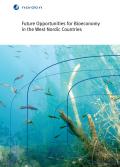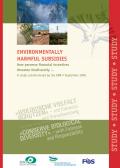
This policy brief contains key findings and recommendations for improvements in existing collection and recycling systems for plastic waste from households and other municipal waste sources, a project within the Nordic Prime Ministers’ initiative, The Nordic Region – leading in green growth. It is one of six Nordic projects focusing on resource efficient recycling of plastic and textile waste.
This report examines how budgets can be greening by pricing carbon and cutting environmental harmful subsidies. The publication provides lessons on how greening the budget combines fiscal responsibility with the environmental sensibility that is inevitable for a sustainable future.

This Green Budget Germany (GBG) study commissioned by the Deutscher Naturschutzring (DNR) is an analysis of the comprehensive literature available on environmentally harmful subsidies and financial incentives. It presents case studies from around the world and makes proposals on dismantling subsidies.
This report was commissioned by the Deutsche Gesellschaft für Technische Zusammenarbeit (GTZ) GmbH and written by Green Budget Germany. Its objective is to present an analysis of economic instruments in use in selected OECD and Latin American countries in the areas of waste prevention and integrated municipal and commercial waste management. Economic instruments identified in the countries of the case sample are: municipal waste charges, landfill taxes, landfill permit trading schemes, deposit-refund schemes and Advanced Recycling Fees.
The Seminar aims to train future leaders of developing countries to acquire the tools required to achieve a comprehensive overview of the issues of trade and environment in the context of the sustainable development agenda. Also, at the end of the course participants will have the skills to negotiate and...
The key areas addressed by this course are: a general introduction to climate change, the science and impacts, and key international and regional policies in place to tackle it i.e. the Kyoto Protocol and the post-Kyoto discussions; climate risk: what are the key risks and what does it mean for...
The International Guidebook of Environmental Finance Tools provides guidance on developing and implementing the most commonly used, widely applicable, and potentially high-impact environmental finance tools. It aims to define and analyse the primary tools that are already in use and that can be applied globally to advance sustainable development. The...
A vibrant forestry industry can mean a brighter future for nations that pursue modern, sustainable forestry management practices: more and better jobs; lower environmental impact; a carbon neutral industry; and a renewable, sustainable approach to economic development. Viet Nam is receiving help to achieve these very goals from Finland's government...
ClimateTechWiki offers a platform for a wide range of stakeholders in developed and developing countries who are involved in technology transfer and the wider context of low emission and low vulnerability development. ClimateTechWiki offers detailed information on a broad set of mitigation and adaptation technologies.
Registration is free and registered...
